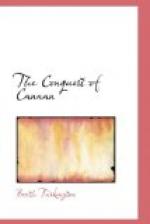Having elected an elaborate course in the Arts, at the University which was of his possessions, what more natural than that Eugene should seek the Metropolis for the short Easter vacation of his Senior year, in order that his perusal of the Masters should be uninterrupted? But it was his misfortune to find the Metropolitan Museum less interesting than some intricate phases of the gayety of New York—phases very difficult to understand without elaborate study and a series of experiments which the discreetly selfish permit others to make for them. Briefly, Eugene found himself dancing, one night, with a young person in a big hat, at the “Straw-Cellar,” a crowded hall, down very deep in the town and not at all the place for Eugene.
Acute crises are to be expected at the “Straw-Cellar,” and Eugene was the only one present who was thoroughly surprised when that of this night arrived, though all of the merrymakers were frightened when they perceived its extent. There is no need to detail the catastrophe. It came suddenly, and the knife did not flash. Sick and thinking of himself, Eugene stood staring at the figure lying before him upon the reddening floor. A rabble fought with the quick policemen at the doors, and then the lights went out, extinguished by the proprietor, living up to his reputation for always being thoughtful of his patrons. The place had been a nightmare; it became a black impossibility. Eugene staggered to one of the open windows, from the sill of which a man had just leaped.
“Don’t jump,” said a voice close to his ear. “That fellow broke his leg, I think, and they caught him, anyway, as soon as he struck the pavement. It’s a big raid. Come this way.”
A light hand fell upon his arm and he followed its leading, blindly, to find himself pushed through a narrow doorway and down a flight of tricky, wooden steps, at the foot of which, silhouetted against a street light, a tall policeman was on guard. He laid masterful hands on Eugene.
“’SH, Mack!” whispered a cautious voice from the stairway. “That’s a friend of mine and not one of those you need. He’s only a student and scared to death.”
“Hurry,” said the policeman, under his breath, twisting Eugene sharply by him into the street; after which he stormed vehemently: “On yer way, both of ye! Move on up the street! Don’t be tryin’ to poke yer heads in here! Ye’d be more anxious to git out, once ye got in, I tell ye!”
A sob of relief came from Bantry as he gained the next corner, the slight figure of his conductor at his side. “You’d better not go to places like the `Straw-Cellar,’ " said the latter, gravely. “I’d been watching you for an hour. You were dancing with the girl who did the cutting.”
Eugene leaned against a wall, faint, one arm across his face. He was too ill to see, or care, who it was that had saved him. “I never saw her before,” he babbled, incoherently, “never, never, never! I thought she looked handsome, and asked her if she’d dance with me. Then I saw she seemed queer—and wild, and she kept guiding and pushing as we danced until we were near that man—and then she—then it was all done—before—”




